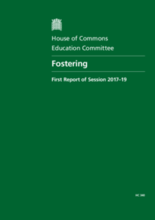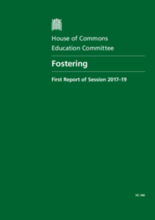

Displaying 1091 - 1100 of 1585
This research collected rare and vital primary data by interviewing practitioners within looked-after children’s, residential, and respite services. The study established that practitioners lacked basic awareness of radicalisation and extremism, the Prevent strategy, and the Channel programme.
For many social workers, participatory practice may seem an unachievable goal, particularly in the field of child protection. This paper discusses a significant programme of change in one London local authority, as part of which the authors undertook 110 observations of practice and provided more than eighty follow-up coaching sessions for workers.
This report continues a predecessor Committee’s inquiry into fostering in the UK. It emphasizes the importance of valuing the young people in foster care, foster carers, and the foster care system itself.
This paper provides an overview of the post 2015 immigration crisis in key European countries with a special focus on current demographics, refugee children, mental health studies, policies and practical support available for refugees.
The Education Committee of the UK's Parliament has published a report on Foster Care. The report includes conclusions and recommendations for valuing young people in care as well as foster carers and the care system.
This article examines whether migrant children are viewed differently than native children, employing an experiment on a representative sample of the populations of Austria, Norway and Spain.
This study aimed to (1) evaluate the indicated prevention program Teaching Recovery Techniques (TRT) in a community setting and describe the program’s effects on symptoms of PTSD and depression in unaccompanied refugee minors; and (2) examine participants’ experiences of the program.
This is the second briefing paper published as part of the Howard League’s two-year programme to end the criminalisation of children in residential care. It explores how good practice in the policing of children’s homes can significantly reduce the unnecessary criminalisation of vulnerable children and demand on police resources.
Record rise in number of care applications has prompted England's most senior family court judge to warn of a looming “crisis”.
The present study is based on life mode interviews with social workers who started their careers in child protection services, focusing on their daily lives as newly graduated professionals.



